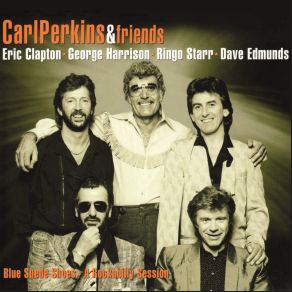Carl Perkins & Friends
Download links and information about Carl Perkins & Friends by Rosanne Cash, Dave Edmunds, Carl Perkins, Ringo Starr, George Harrison, Eric Clapton. This album was released in 2002 and it belongs to Rock, Rock & Roll, World Music, Country, Rockabilly genres. It contains 18 tracks with total duration of 55:35 minutes.

|
|
|---|---|
| Artist: | Rosanne Cash, Dave Edmunds, Carl Perkins, Ringo Starr, George Harrison, Eric Clapton |
| Release date: | 2002 |
| Genre: | Rock, Rock & Roll, World Music, Country, Rockabilly |
| Tracks: | 18 |
| Duration: | 55:35 |
| Buy it NOW at: | |
| Buy on iTunes $9.99 | |
| Buy on Amazon $8.99 | |
Tracks
[Edit]| No. | Title | Length |
|---|---|---|
| 1. | Boppin' the Blues | 2:57 |
| 2. | Put Your Cat Clothes On | 3:31 |
| 3. | Honey Don't | 4:06 |
| 4. | Matchbox | 3:21 |
| 5. | Mean Woman Blues | 3:10 |
| 6. | Turnaround | 3:17 |
| 7. | Going to Jackson | 3:04 |
| 8. | What Kind of Girl | 2:46 |
| 9. | Everybody's Trying to Be My Baby | 2:43 |
| 10. | Your True Love | 4:18 |
| 11. | Waiting for the Sunrise | 2:17 |
| 12. | That's Alright Mama / Blue Moon of Kentucky / Night Train to Memphis | 5:21 |
| 13. | Glad All Over | 2:35 |
| 14. | Whole Lotta' Shakin' goin' on | 2:30 |
| 15. | Gone Gone Gone | 2:38 |
| 16. | Blue Suede Shoes | 3:11 |
| 17. | Blue Suede Shoes Encore | 2:54 |
| 18. | Gone Gone Gone Encore | 0:56 |
Details
[Edit]This album is the audio portion of a filmed concert held on Oct. 21, 1985, in London. Though Carl Perkins was one of the key early rock ’n’ rollers who influenced future generations beyond measure, it’s safe to say his public profile never matched those of the people he touched, from Elvis Presley (who covered his “Blue Suede Shoes”), The Beatles (who covered several of his best songs), or, arguably, even Rockpile’s Dave Edmunds, who plays guitar and produces this set of powerful performances between Perkins and his musical children. Ringo Starr takes the mic for “Honey Don’t,” and George Harrison sings “Everybody’s Trying to Be My Baby.” Eric Clapton takes the solo in “Matchbox.” Rosanne Cash sings “What Kind of Girl” and duets on “Going to Jackson.” The incredible song list is a credit to Perkins’ genius, and the performances from the ‘80s are produced to reflect a ‘50s sense of pure rockabilly. The between-song banter of these live performances is touching without being cloying. Rock from the '50s is often filed under “oldies,” but nothing sounds old about any of the music here.